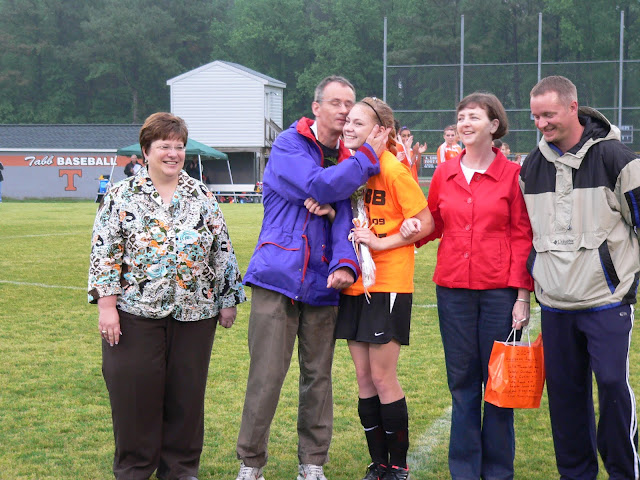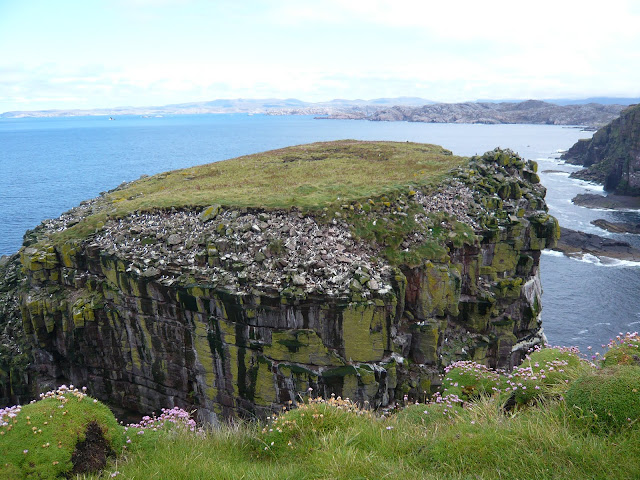We went on a wonderful journey yesterday to Handa Isle, a small, uninhabited island known for its huge colonies of seabirds. The road to Handa took us through the magical highlands of the West. The rolling hills were interspersed with breath-taking, terrifyingly grand mountains (there really aren't enough adjectives in the English language to embody them). There were several moments when we came through a pass in a mountain and a vista like this appeared, and I couldn't decide if I wanted to be Marianne Dashwood or Aragorn or High King Peter or Pocahontas, but I knew that I wanted to stay there forever, roaming the moors and soaking in the magic.
Honestly, and I know this sounds melodramatic (permission to roll eyes granted), I was on the verge of tears when I saw that little river winding its way to that loch. How perfect.
Handa Island itself did not disappoint. The only sounds we could hear were bird calls and the constant, muted murmur of the waves hitting the cliffs below. We walked 4 1/2 miles around the island, stopping on the north edge, where the majority of the birds were located.
The birds were just preparing to nest, so there were plenty of squabbles over who got to nest where. The gulls were exceptionally vociferous. We also saw Kittiwakes, Gullimots, Great Skuas, Arctic Skuas, and, most importantly, Puffins. There is a special place in my heart for Puffins. Their quirky appearance and awkward waddle are so endearing and sweet. When we first got to the viewing place, all of the birds were across a huge crevasse on a stack.
We were standing on the cliff in the right of this picture. You can see how far away it was. We had binoculars and I saw a few Puffins from far away, but I couldn't get any good pictures and I couldn't help but feel a little disappointed that we had come all this way for a few passing glimpses of orange beaks and feet. We started moving on, but then Granny suggested we leave the path and walk around to the other side of the cliff where this picture was taken from. So we walked around, took a seat, and waited. And then, a miracle occurred.
This little guy popped out from his hole about ten feet from where we sat. Again (this seems to happen a lot to me) I almost cried. I held my breath and took picture after picture for fear that he would fly off in a moment and I'd never see him again.
But he patiently waited, turning his head back and forth to let me get every profile I wanted. Then he walked around a little so I could get some action shots. I thought the trip couldn't get any better, and then...
Out came his wife. They looked up through my eyes and into my soul and I'm pretty sure I heard one of them say, "You're welcome." Either that or, "This crying stuff is getting ridiculous. Get a backbone, woman." It was a humbling and wonderful experience.
We sat on this cliff for about 15 minutes, enchanted by the sky and our new friends and the blustery wind and the way the light blue water faded to dark blue as it approached the horizon and silvery-gray as it approached the cliffs. Most of those black and white birds on the edges of the stack are Kittiwakes. Most of the Puffins lived on top, while the gulls lived on ledges down the side of the cliffs. The Skuas nested in the marshes away from the path. We stayed away from them because Skuas can get vicious if you disturb their nest.
I love these mounds. They look like they belong in Alice and Wonderland. The dainty little flowers on the top are called
Armeria maritinum, or Sea Pinks, and during the spring months they cover the island.
Sometimes it is necessary to leave the path.
Other than birds, the only other animals we spotted on the island were rabbits. We saw rabbits in droves, which is actually one of several
collective nouns used to describe rabbits. Other leporine collective nouns are warren, nest, colony, bevey, bury, or trace. Just an aside, I love collective nouns. After we left the cliffs, we ambled around the rest of the island, avoiding puddles and searching for whales and singing The Hills Are Alive With The Sound Of Music (aaaah-ah-ah-aaaah). We got back to the shore, and hopped on the ferry to go back to the mainland.

The boat had odd seats that you straddled like you were riding a horse. Instead of a pier, there was a wooden plank that they rolled up to the boat once it came ashore. We got some hot chocolate at the Shorehouse and stopped in Ullapool for takeaway fish and chips on the way home. We ate the fish sans utensils, which I think made it more delicious. By the way, don't you just love the name Ullapool? I think Scottish names are the most beautiful names in the whole world. By the time we got home, we were exhausted but completely fulfilled. Once we recover, we will start planning our next adventure. I'm hoping a castle will be involved.
I left a piece of my heart on Handa.
P.S. I utilized a famous, award-winning loo at the Shorehouse. Be jealous. It was an unforgettable experience.




































